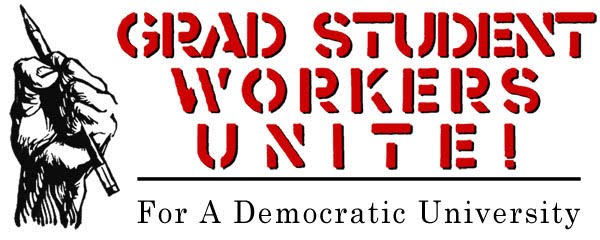Below is the text of a letter FADU has sent to the UAW 4121 Executive Board. We want to share it with you in order to continue broad engagement with matters affecting graduate student workers. The letter calls on the EBoard to reply in writing to these concerns. We also plan to bring this issue to the UAW Membership Meeting on Tuesday (5/31 at 3:30 in
Foege N130), and hope you will be able to attend with your own clarifying questions as we near the end of the quarter.
Please forgive cross postings as we share this document widely--and do join us in sharing this with all ASEs
------------------------------------------------
May 28, 2011
Open Letter to the UAW 4121 Executive Board/BargainingTeam
To the UAW 4121 Executive Board,
As the spring quarter draws to a close and bargaining with the University of Washington enters the fourth week after the April 30 contract expiration, we write with regards to the ongoing negotiations. While the bargaining updates of May 20th, May 6th, and May 4th all indicate ongoing conversations about two of the major issues on the table (fee waivers and health care coverage), a third bargaining item proposed in the update sent on April 30th has not been mentioned since: a one year contract “which would expire June 30, 2011” [sic]. We write with concern for the third item, to call attention to it and to elicit explanation from the Bargaining Team.
Our first question: is the proposed end date June 30, 2011 or June 30, 2012?
Assuming the latter, there are two concerns we call on the UAW Bargaining Team to address. The first is the decision to enter into a second one-year contract. Last year UAW Local 4121 concluded a three-year contract and the membership voted to ratify the one year contract we are now concluding. We, members of UAW 4121 and of FADU, reiterate our concern that another one-year contract will make us vulnerable to yet another year of possible takeaways and harsh cutbacks. How does this short-term contract provide protection to ASE workers and strengthen our union?
Our second concern is the proposed contract expiration date of June 30th. Such a late expiration date would move the bargaining process to a time when the majority of ASEs have concluded their contractual obligations for the year. With the majority of ASEs off-campus, neither leading sections and classes, nor grading papers, nor conducting research, our power to unite and fight as workers will be limited. Resources for visible and vocal support of UAW bargaining will be eliminated. The possibility of a strike will be removed. What benefits outweigh the destruction of our two greatest strengths: our voice and our labor?
A third question this issue raises is pertinent to both this year and next: what is the procedure for the contract ratification vote if negotiations proceed into the summer? The fourth contract extension has expired, a fifth has been established. With only one week and finals left in the quarter, we request information concerning how the E-Board proposes to present a contract to rank-and-file for ratification. What will the procedure be in future years if the June 30th expiration date is ratified? According to the UAW International Constitution, it is the responsibility of the Bargaining Team to present the proposed contract to the vote of Local Union Membership. The local bylaws prohibit regular membership meetings from June 16th through September 15th and also require the Bargaining Team to present the final contract to the membership for ratification (Article 19, Section 3). Though the Executive Board retains the power of highest authority between membership meetings, matters concerning the vital interests of the Local Union are subject to the approval of the membership (Article 7, Section 2). By what procedure does the UAW Executive Board propose to fulfill these obligations, present the contract to rank-and-file members for approval, and enter into negotiations with the full strength of membership available to support the process of bargaining for a fair contract?
We call on the UAW Executive Board to respond by email to the membership to address the concerns raised by what appears to be a minor change in dates, but is in fact a serious threat to the strength of our union.
In Solidarity,
For A Democratic University

